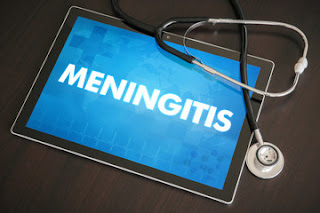Nigeria has been plagued with the meningitis epidemic many times in recent years, once of the most deadly being in 1996 when 109,580 cases and 11,717 deaths were recorded. This meningitis has resurfaced again and is spread rapidly. Also, this time, the meningitis outbreak in 2017 is being
caused by Neisseria Meningitides type C rather
than the known Meningitides Type A. But the good news is that it is very preventable. If Nigeria was able to overcome the deadly ebola virus, then meningitis should not pose as a threat. Every Nigerian just needs to be well informed an make healthy choices. Today I prepared a simple infographic that explains everything you need to about meningitis and to prevent it. But let us concisely summarize all there is to know first.
Meningitis is a condition with several forms, some of which can be fatal. Meningitis is characterized by severe headache and stiff neck, and it is an inflammation of the spinal cord and the brain. Usually, it is caused by an infection. Although rare, it has the potential to affect all age groups.
Nigeria has a long history of CSM epidemics. One of the worst occurred in 1996 when 109,580 cases and 11,717 deaths were recorded.
Read more at: http://www.vanguardngr.com/2017/04/meningitis-every-nigerian-know/
Nigeria has a long history of CSM epidemics. One of the worst occurred in 1996 when 109,580 cases and 11,717 deaths were recorded.
Read more at: http://www.vanguardngr.com/2017/04/meningitis-every-nigerian-know/
Nigeria has a long history of CSM epidemics. One of the worst occurred in 1996 when 109,580 cases and 11,717 deaths were recorded.
Read more at: http://www.vanguardngr.com/2017/04/meningitis-every-nigerian-know/
Infections that lead to meningitis can be spread airborne, by coming into contact with an infected person who is coughing or sneezing. The telltale symptoms of meningitis are severe headache, fever, and stiff neck. Treatment depends on the cause.
The types of meningitis include bacterial, viral, fungal, parasitic, amebic, and non-infectious. Bacterial meningitis requires immediate emergency medical attention. When it comes to viral meningitis, patients can typically recover on their own. Amebic and parasitic meningitis are more rarely occurring.
Other symptoms include loss of appetite, sensitivity to light, confusion, and seizures.
SIMPLE TIPS TO PREVENT MENINGITIS
To prevent meningitis, it is essential that you wash your hands thoroughly throughout the day and cover your mouth when sneezing or coughing. It is also recommended to receive meningitis vaccinations that are appropriate for your age group. There are three meningococcal vaccinations available in the United States: MPSV4, MCV4, and Serogroup B meningococcal vaccine. Teenagers should be vaccinated at ages 11 and 16. The meningitis vaccination is injected into the arm muscle, just like the influenza vaccine. MPSV4 is the only meningitis vaccination approved for patients 55 years of age or older. Meningitis vaccination is required if you are 11-18 years old, have been exposed to a meningitis outbreak, are a military recruit, have an immune system disorder (this weakens your immunity, therefore making you vulnerable to the infections that lead to meningitis), or are traveling to any area where meningitis is more common. You should talk to your doctor about vaccination if you are severely ill, have had any serious reaction to other vaccines, or have ever had Guillain-Barre syndrome, which can be triggered by an infection. If you are pregnant, the chances are that you will be able to receive the meningitis vaccine, but talk to your doctor to make sure. Signs of an allergic reaction to the meningitis must be taken extremely seriously as an allergic reaction can be fatal. These signs include dizziness, sudden outbreak of hives, trouble breathing, wheezing, weakness, and increased heart rate.
When it comes to other side effects, some patients experience extremely brief redness, irritation, and itchiness at the spot of the vaccination injection. These should subside after two to three days. If you or your child experience signs of an allergic reaction, get to your doctor immediately. Meningitis can be fatal. Visit a healthcare professional if you notice any combination of meningitis symptoms in yourself or your child. Treatment for bacterial meningitis must be carried out as soon as possible, and includes intravenous antibiotics possibly combined with other medications. The antibiotic choice depends on what bacterium caused the infection. Viral meningitis is not treated with antibiotics. In most cases, viral meningitis will improve on its own. Noninfectious meningitis may be treated with corticosteroids, but some cases may resolve on their own.
Now please view the infographic about meningitis below:
Share this Image On Your Site
Thanks for reading and make sure you share this with everyone.









